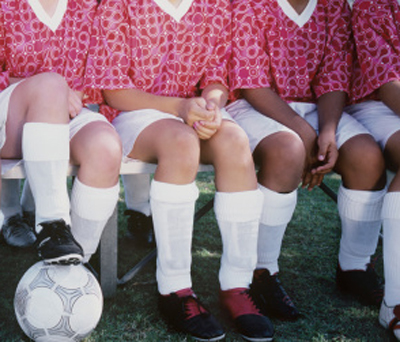
Why are female athletes up to nine times more likely to experience an anterior cruciate ligament (ACL) injury than their male counterparts?
The reasons lie in the physical differences between male and females — these differences can put greater stress on a female athlete’s knees during sports that involve quick changes in direction, resulting in more ACL injuries.
Washington University physician and pediatric sports medicine specialist, Mark Halstead, MD, says, “Sports like jogging, swimming and biking place little stress on the ACL. However, sports that involve cutting, planting and changing direction such as soccer, basketball and volleyball, pose a greater risk for ACL injury. There are several reasons why ACL tears in these non-contact sports are more common for female athletes.”
Q Angle: Females typically have a wider pelvis, which makes the thigh bones angle downward more sharply than men. This increased ‘Q angle’ between the femur and the tibia places more stress on the ACL.
Flat-footed landing: Females tend to land a jump in a flat-footed position – as opposed to landing on the balls of their feet. If the knee is not in the proper position and the calf muscles are not absorbing the force, the knee buckles and tears the ACL.
Posture: Females may be more prone to non-contact ACL injuries because they run and cut sharply in a more erect posture than males.
Muscle strength differences: Compared to males, most females have less muscular strength in their hamstrings. If the hamstring cannot balance the power of the quadriceps (front thigh muscle), the imbalance can cause significant stress to the ACL — leading to injury.
Dr. Halstead explains, “If the physical exam of the patient and MRI determine that the ACL is torn, surgical intervention is the next step. Physical therapy usually lasts six months to a year. Once healed, the athlete can return to all activities.
ACL injury reduction programs help decrease the likelihood of ACL tears. These jump training programs help develop muscle strength and muscle memory to land more appropriately from a jump, without buckling the knee.”
To make an appointment with Dr. Halstead, or any Washington University orthopedic specialist, please call: 314-514-3500.
Patients are seen at three convenient locations:
St. Louis Children’s Hospital
1 Children’s Place
St. Louis, MO 63110
Washington University and Barnes-Jewish Orthopedic Center
14532 S. Outer 40 Drive
Chesterfield, MO 63017
Children’s Specialty Care Center
13001 North Outer Forty, Suite 1C
Chesterfield, MO 63017